unit1 What's the matter SectionA GF-4c 课件(共21张PPT)人教版八年级下册
文档属性
| 名称 | unit1 What's the matter SectionA GF-4c 课件(共21张PPT)人教版八年级下册 |
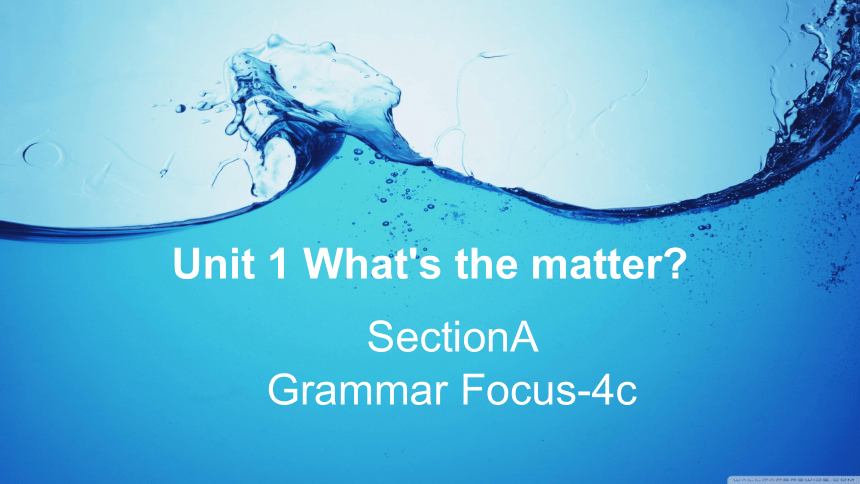
|
|
| 格式 | pptx | ||
| 文件大小 | 1.9MB | ||
| 资源类型 | 教案 | ||
| 版本资源 | 人教新目标(Go for it)版 | ||
| 科目 | 英语 | ||
| 更新时间 | 2024-02-28 21:57:53 | ||
图片预览

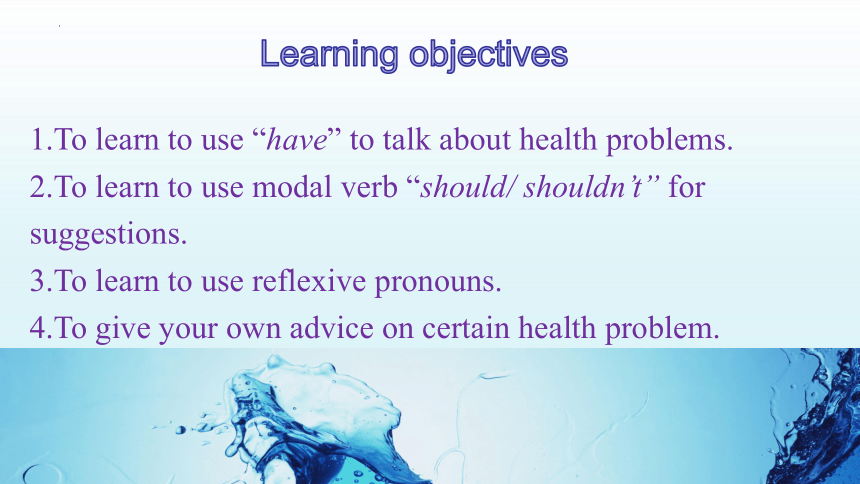

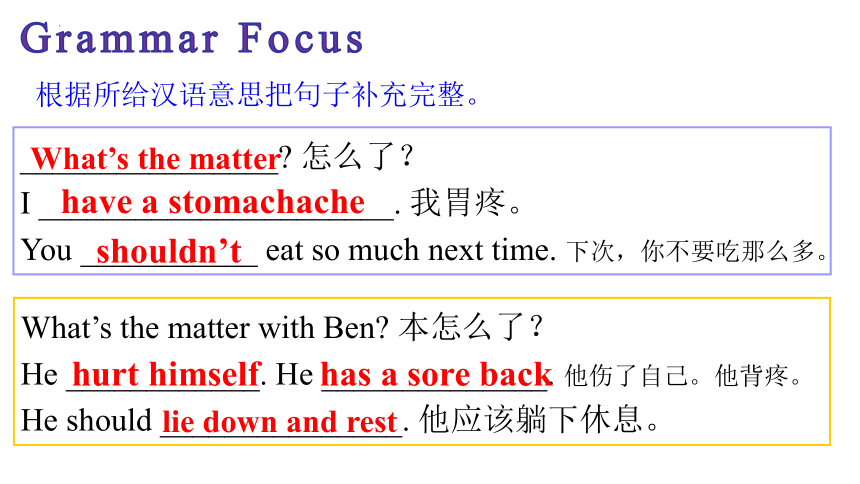
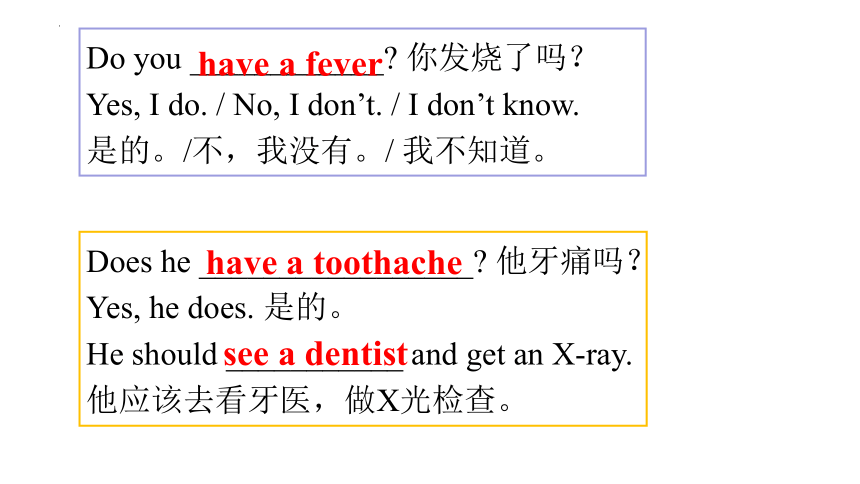
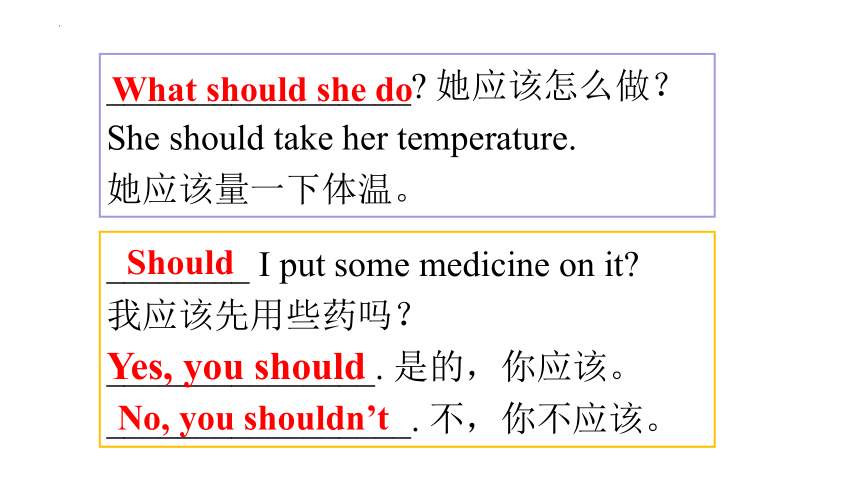
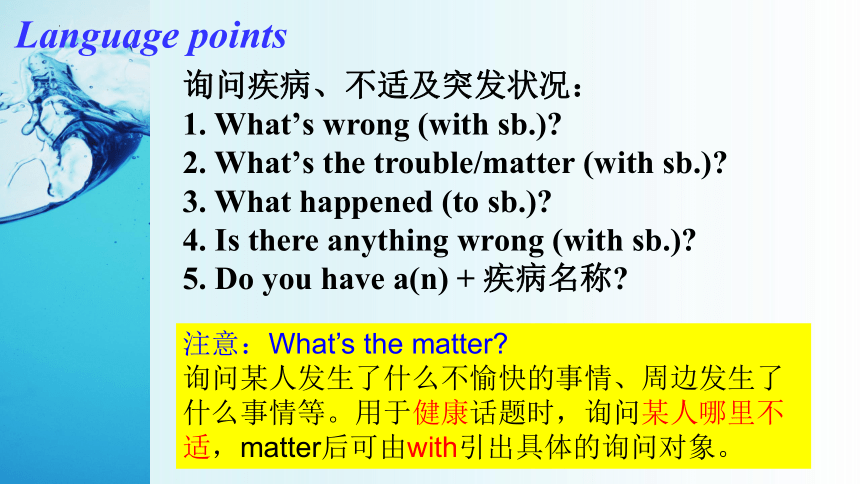
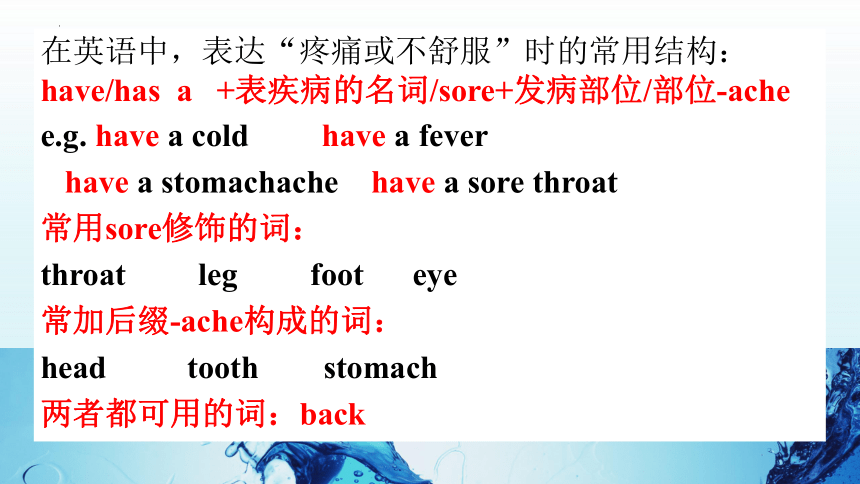
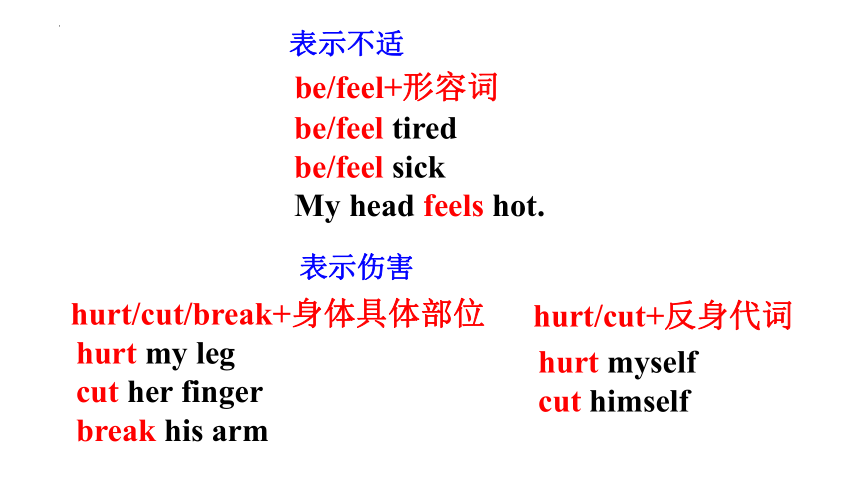
文档简介
(共21张PPT)
Unit 1 What's the matter
SectionA
Grammar Focus-4c
1.To learn to use “have” to talk about health problems.
2.To learn to use modal verb “should/ shouldn’t” for suggestions.
3.To learn to use reflexive pronouns.
4.To give your own advice on certain health problem.
Learning objectives
——What’s the matter with him/her
——He /She _________.
——What should he/she do
——He/She should...
Revision
Grammar Focus
根据所给汉语意思把句子补充完整。
________________ 怎么了?
I ______________________. 我胃疼。
You ___________ eat so much next time. 下次,你不要吃那么多。
What’s the matter with Ben 本怎么了?
He ____________. He ______________. 他伤了自己。他背疼。
He should _______________. 他应该躺下休息。
What’s the matter
have a stomachache
shouldn’t
hurt himself
has a sore back
lie down and rest
Do you ____________ 你发烧了吗?
Yes, I do. / No, I don’t. / I don’t know.
是的。/不,我没有。/ 我不知道。
have a fever
Does he _________________ 他牙痛吗?
Yes, he does. 是的。
He should ___________ and get an X-ray.
他应该去看牙医,做X光检查。
have a toothache
see a dentist
What should she do
_________________ 她应该怎么做?
She should take her temperature.
她应该量一下体温。
________ I put some medicine on it
我应该先用些药吗?
_______________. 是的,你应该。
_________________. 不,你不应该。
Should
Yes, you should
No, you shouldn’t
Language points
询问疾病、不适及突发状况:
1. What’s wrong (with sb.)
2. What’s the trouble/matter (with sb.)
3. What happened (to sb.)
4. Is there anything wrong (with sb.)
5. Do you have a(n) + 疾病名称
注意:What’s the matter
询问某人发生了什么不愉快的事情、周边发生了什么事情等。用于健康话题时,询问某人哪里不适,matter后可由with引出具体的询问对象。
在英语中,表达“疼痛或不舒服”时的常用结构:
have/has a +表疾病的名词/sore+发病部位/部位-ache
e.g. have a cold have a fever
have a stomachache have a sore throat
常用sore修饰的词:
throat leg foot eye
常加后缀-ache构成的词:
head tooth stomach
两者都可用的词:back
表示不适
be/feel+形容词
be/feel tired be/feel sick
My head feels hot.
表示伤害
hurt/cut+反身代词
hurt/cut/break+身体具体部位
hurt my leg cut her finger
break his arm
hurt myself
cut himself
should
should modal v. (情态动词)后接动词原形, 用于提出建议劝告别人。
否定形式为should not, 缩写为shouldn’t,意思是“不应当;不该”。
1. — Tom, I have a toothache. Tom, 我牙痛。
— You should see a dentist. 你应当去看牙医。
2.— I ate too much food yesterday, so I have a stomachache.
我昨天吃太多了,现在胃痛。
— You shouldn’t eat so much. 你不应该吃那么多的。
含should的一般疑问句是将should提至主语前;
其简略回答:Yes, 主语(人称代词)+should.
No, 主语(人称代词)+shouldn’t.
含should的特殊疑问句:特殊疑问词+should…
3. — Should I put some medicine on it
— Yes, you should. / No, you shouldn’t.
4. — What should he do
— He should lie down and rest.
reflexive pronouns(反身代词)
反身代词表示动作行为反射到行为执行者本身。它还可以在句中起到强调的作用,用以加强语气。反身代词在使用时应注意和它所指的相应的对象在人称、性别、数上保持一致。
第一人称(单数) 第一人称 (复数) 第二人称(单复数) 第三人称(单数) 第三人称(复数)
主格 I we you he/she/it they
宾格 me us you him/her/it them
反身代词 myself ourselves yourself (yourselves) himself herself itself themselves
反身代词的用法:
1. 可用作宾语,指的是宾语和主语表示同一个或同一些的人物。
e.g. I like myself. 我爱我自己。
2. 用作表语,指的是表语和主语表示同一个或同一些人或事物。
e.g. Just be yourself. 做你自己就好了。
3. 可用作主语或宾语的同位语,常用来加强语气。
e.g. I met the writer himself last week.
我上周见到了那位作家本人。
4. 某些固定短语当中。
照顾自己 look after/take care of oneself
自学 teach oneself sth./ learn sth. by oneself
玩得高兴,过得愉快 enjoy oneself
随便吃/喝些…… help oneself to sth.
伤着某人自己 cut oneself 自言自语 say to oneself
摔伤自己 hurt oneself 介绍自己 introduce oneself
5. 注意!反身代词不能单独作主语,但可以作主语的同位语,起强调作用。
e.g. I myself can finish my homework. / I can finish my homework myself. 我能自己完成作业。
Exercises
1. —I saw your grandma using Douyin on the phone. Who taught her
—Nobody. She taught ____.
A. himself B. myself C. herself
2. —My best friend is more popular than me. I want to be like him.
—It's not necessary to be the same. You should just be
________.
A. himself B. yourself C. myself
3. He is so clever, he can do many things by ____.
A. himself B. myself C. herself
4. Lily will arrive in Changchun tomorrow. Let's have a
party for _______.
A. her B. she C. herself
4a
Fill in the blanks and practice the conversations.
A: I hurt ______ when I played basketball yesterday.
What _______ I do
B: You ______ see a doctor and get an X-ray.
2. A: _______ the matter
B: My sister and I ______ sore throats. _______ we go to school
A: No, you _________.
3. A: ______ Mike ______ a fever
B: No, he _______. He ______ a stomachache.
A: He ______ drink some hot tea.
myself
should
should
What’s
have
Should
shouldn’t
Does
have
doesn’t
has
should
4b
Circle the best advice for these health problems. Then add your own advice.
1. Jenny cut herself.
She should (get an X-ray / put some medicine on the cut).
My advice: _________________________.
2. Kate has a toothache.
She should (see a dentist /get some sleep).
My advice: ________________________.
Put a bandage on it
She shouldn’t eat cold food
3. Mary and Sue have colds.
They shouldn’t (sleep/ exercise).
My advice: __________________.
4. Bob has a sore back.
He should (lie down and rest / take his temperature).
My advice: ______________.
Drink more water
Get an X-ray
One student mimes a problem. The other students in your group guess the problem and give advice.
Name Problem Advice
Liu Peng fall down go home and rest
A: What’s the matter Did you hurt yourself playing soccer
B: No, I didn’t.
C: Did you fall down
B: Yes, I did.
D: You should go home and get some rest.
4c
跌倒。倒塌
1. Recite Grammar Focus.
2. Add health advice for each of the health problems. (e.g. head—headache—take some medicine…)
Unit 1 What's the matter
SectionA
Grammar Focus-4c
1.To learn to use “have” to talk about health problems.
2.To learn to use modal verb “should/ shouldn’t” for suggestions.
3.To learn to use reflexive pronouns.
4.To give your own advice on certain health problem.
Learning objectives
——What’s the matter with him/her
——He /She _________.
——What should he/she do
——He/She should...
Revision
Grammar Focus
根据所给汉语意思把句子补充完整。
________________ 怎么了?
I ______________________. 我胃疼。
You ___________ eat so much next time. 下次,你不要吃那么多。
What’s the matter with Ben 本怎么了?
He ____________. He ______________. 他伤了自己。他背疼。
He should _______________. 他应该躺下休息。
What’s the matter
have a stomachache
shouldn’t
hurt himself
has a sore back
lie down and rest
Do you ____________ 你发烧了吗?
Yes, I do. / No, I don’t. / I don’t know.
是的。/不,我没有。/ 我不知道。
have a fever
Does he _________________ 他牙痛吗?
Yes, he does. 是的。
He should ___________ and get an X-ray.
他应该去看牙医,做X光检查。
have a toothache
see a dentist
What should she do
_________________ 她应该怎么做?
She should take her temperature.
她应该量一下体温。
________ I put some medicine on it
我应该先用些药吗?
_______________. 是的,你应该。
_________________. 不,你不应该。
Should
Yes, you should
No, you shouldn’t
Language points
询问疾病、不适及突发状况:
1. What’s wrong (with sb.)
2. What’s the trouble/matter (with sb.)
3. What happened (to sb.)
4. Is there anything wrong (with sb.)
5. Do you have a(n) + 疾病名称
注意:What’s the matter
询问某人发生了什么不愉快的事情、周边发生了什么事情等。用于健康话题时,询问某人哪里不适,matter后可由with引出具体的询问对象。
在英语中,表达“疼痛或不舒服”时的常用结构:
have/has a +表疾病的名词/sore+发病部位/部位-ache
e.g. have a cold have a fever
have a stomachache have a sore throat
常用sore修饰的词:
throat leg foot eye
常加后缀-ache构成的词:
head tooth stomach
两者都可用的词:back
表示不适
be/feel+形容词
be/feel tired be/feel sick
My head feels hot.
表示伤害
hurt/cut+反身代词
hurt/cut/break+身体具体部位
hurt my leg cut her finger
break his arm
hurt myself
cut himself
should
should modal v. (情态动词)后接动词原形, 用于提出建议劝告别人。
否定形式为should not, 缩写为shouldn’t,意思是“不应当;不该”。
1. — Tom, I have a toothache. Tom, 我牙痛。
— You should see a dentist. 你应当去看牙医。
2.— I ate too much food yesterday, so I have a stomachache.
我昨天吃太多了,现在胃痛。
— You shouldn’t eat so much. 你不应该吃那么多的。
含should的一般疑问句是将should提至主语前;
其简略回答:Yes, 主语(人称代词)+should.
No, 主语(人称代词)+shouldn’t.
含should的特殊疑问句:特殊疑问词+should…
3. — Should I put some medicine on it
— Yes, you should. / No, you shouldn’t.
4. — What should he do
— He should lie down and rest.
reflexive pronouns(反身代词)
反身代词表示动作行为反射到行为执行者本身。它还可以在句中起到强调的作用,用以加强语气。反身代词在使用时应注意和它所指的相应的对象在人称、性别、数上保持一致。
第一人称(单数) 第一人称 (复数) 第二人称(单复数) 第三人称(单数) 第三人称(复数)
主格 I we you he/she/it they
宾格 me us you him/her/it them
反身代词 myself ourselves yourself (yourselves) himself herself itself themselves
反身代词的用法:
1. 可用作宾语,指的是宾语和主语表示同一个或同一些的人物。
e.g. I like myself. 我爱我自己。
2. 用作表语,指的是表语和主语表示同一个或同一些人或事物。
e.g. Just be yourself. 做你自己就好了。
3. 可用作主语或宾语的同位语,常用来加强语气。
e.g. I met the writer himself last week.
我上周见到了那位作家本人。
4. 某些固定短语当中。
照顾自己 look after/take care of oneself
自学 teach oneself sth./ learn sth. by oneself
玩得高兴,过得愉快 enjoy oneself
随便吃/喝些…… help oneself to sth.
伤着某人自己 cut oneself 自言自语 say to oneself
摔伤自己 hurt oneself 介绍自己 introduce oneself
5. 注意!反身代词不能单独作主语,但可以作主语的同位语,起强调作用。
e.g. I myself can finish my homework. / I can finish my homework myself. 我能自己完成作业。
Exercises
1. —I saw your grandma using Douyin on the phone. Who taught her
—Nobody. She taught ____.
A. himself B. myself C. herself
2. —My best friend is more popular than me. I want to be like him.
—It's not necessary to be the same. You should just be
________.
A. himself B. yourself C. myself
3. He is so clever, he can do many things by ____.
A. himself B. myself C. herself
4. Lily will arrive in Changchun tomorrow. Let's have a
party for _______.
A. her B. she C. herself
4a
Fill in the blanks and practice the conversations.
A: I hurt ______ when I played basketball yesterday.
What _______ I do
B: You ______ see a doctor and get an X-ray.
2. A: _______ the matter
B: My sister and I ______ sore throats. _______ we go to school
A: No, you _________.
3. A: ______ Mike ______ a fever
B: No, he _______. He ______ a stomachache.
A: He ______ drink some hot tea.
myself
should
should
What’s
have
Should
shouldn’t
Does
have
doesn’t
has
should
4b
Circle the best advice for these health problems. Then add your own advice.
1. Jenny cut herself.
She should (get an X-ray / put some medicine on the cut).
My advice: _________________________.
2. Kate has a toothache.
She should (see a dentist /get some sleep).
My advice: ________________________.
Put a bandage on it
She shouldn’t eat cold food
3. Mary and Sue have colds.
They shouldn’t (sleep/ exercise).
My advice: __________________.
4. Bob has a sore back.
He should (lie down and rest / take his temperature).
My advice: ______________.
Drink more water
Get an X-ray
One student mimes a problem. The other students in your group guess the problem and give advice.
Name Problem Advice
Liu Peng fall down go home and rest
A: What’s the matter Did you hurt yourself playing soccer
B: No, I didn’t.
C: Did you fall down
B: Yes, I did.
D: You should go home and get some rest.
4c
跌倒。倒塌
1. Recite Grammar Focus.
2. Add health advice for each of the health problems. (e.g. head—headache—take some medicine…)
同课章节目录
- Unit 1 What's the matter?
- Section A
- Section B
- Unit 2 I'll help to clean up the city parks.
- Section A
- Section B
- Unit 3 Could you please clean your room?
- Section A
- Section B
- Unit 4 Why don't you talk to your parents?
- Section A
- Section B
- Unit 5 What were you doing when the rainstorm came
- Section A
- Section B
- Review of Units 1-5
- Unit 6 An old man tried to move the mountains.
- Section A
- Section B
- Unit 7 What's the highest mountain in the world?
- Section A
- Section B
- Unit 8 Have you read Treasure Island yet?
- Section A
- Section B
- Unit 9 Have you ever been to a museum?
- Section A
- Section B
- Unit 10 I've had this bike for three years.
- Section A
- Section B
